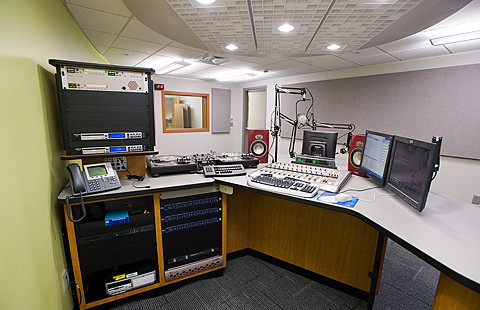![]() Programming on Colgate’s student-run radio station is now being beamed from a new studio that has dramatically increased the station’s visibility and created new opportunities for student deejays.
Programming on Colgate’s student-run radio station is now being beamed from a new studio that has dramatically increased the station’s visibility and created new opportunities for student deejays.
The dreamy digital digs for WRCU (90.1) is in the new Blackmore Media Center, in the lower level of the O’Connor Campus Center (Coop).
“We have gone from extremely little visibility to being in the center of campus,” station general manage Paul Osmolskis said about this summer’s move from cramped quarters in Drake Hall to the Coop.
 |
| Students work in the broadcast room, which can be seen by students walking through the Coop. The station now has 2,350 square feet of space in the very visible spot. (Photo by Andy Daddio) |
Students checking mailboxes or using the popular just-renovated Coop computer lab can see the station’s broadcast room through a large window that features an “On the Air” sign that glows red when deejays are working.
The space previously housed Information Technology Services offices, which are now in the Case Library and Geyer Center for Information Technology.
Work on the studio started in May and was mostly completed by the end of August. After training on the equipment, which includes Harris soundboards and Audio Vault software, students began the first formal day of programming Sept. 15.
“It’s a college radio station on steroids,” said Osmolskis.
|
The station accommodates everything except eight-tracks, and the equipment is very versatile, according to music director Steven Butler ’09.
Bands can perform in the studios to promote their campus performance and the shows can be taped for future use. Deejays can pre-record shows and also do live call-in shows, complete with “delay” functionality. They can create commercials and personal service announcements.
“Administrators asked us what we wanted and the equipment far exceeds what we had hoped for,” said Butler.
Robert Dwyer served as project manager for Colgate, working with architects QPK Design, Peterson Engineering, and Digital Radio Engineering.
The nerve center of the station is the broadcast studio. There also is a production studio, which mimics the main studio in functionality and also gives deejays a place to practice, an edit room, three offices, a server room, and a conference room.
“It was important for students to make it a comfortable space, a place they can get together and talk music,” said Bill Gabler ’07, assistant director of the Center for Leadership and Student Involvement and advisor to WRCU, which is the largest student organization on campus, with more than 170 participants.
English professor Michael Coyle, the group’s academic advisor for the past 18 years, raved about the project.
“The station has been designed with an eye to the future, and is absolutely ready to meet the new digital era,” said Coyle, who has a weekly jazz show on WRCU. “It’s something everyone can be very proud of.”
 |
| The broadcast room is the nerve center of the new station, which also includes a production studio, edit room, three offices, a server room, and a conference room. (Photo by Andy Daddio) |
